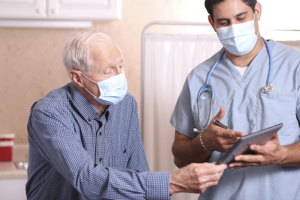Ensuring Safety for Seniors: Is Now the Time to Schedule Elective Medical Procedures?

Safety for seniors is the most important factor when considering elective medical procedures.
The COVID-19 pandemic put our society on pause, including, among various other activities, healthcare appointments and procedures. In fact, as many as 50% of all adults either canceled or delayed routine health care and elective procedures since the coronavirus crisis began, leading doctors to grow concerned about the effects. Yet safety for seniors remains the top priority as we figure out how to navigate these uncharted waters.
While we tentatively strive for a new normal, it is worthwhile to talk to your physician about any procedures you might have been considering pre-pandemic, and to get answers to these questions that will help you gauge the safety of doing the procedures now.
- Is the medical facility where I’ll be treated also treating COVID-19 patients, and are the same medical faculty who will take care of me also caring for them? If that’s the case, what safety measures are in place to ensure my safety?
- What are the facility’s cleaning/disinfecting policies?
- Will I need to be tested for COVID-19 before my appointment?
- Are employees being tested for COVID-19? If so, how often?
- Do I have to wear a mask? Gloves? Any other personal protective equipment?
- Are there any items that are prohibited from being brought with me, such as clothing, books, a phone or laptop?
- Can I fill out paperwork in advance?
- May I wait outside or in my vehicle until I’m called in for my procedure?
- Can a family member or caregiver accompany me?
- Is follow-up provided in person, or am I able to utilize telehealth?
Additionally, there are post-procedure considerations to think through. Lots of people face concerns about the possibility of contracting COVID-19 after staying in the hospital, so consult with your physician in regards to the need to self-monitor for symptoms, as well as tips about any further precautions you may want to take, such as avoiding contact with others for a certain amount of time, wearing a mask or gloves in your house when others are there, additional sanitizing measures to take, etc. The doctor may suggest taking your oxygen levels and temperature in the home. If so, make sure to purchase a thermometer and pulse oximeter.
As soon as you are satisfied with the answers you have received along with the assurance that the procedure is safe to schedule, contact CareWorks Health Services, the leaders in Huntington Beach senior services. Our transitional care services will help make sure everything is taken care of before, during, and after your procedure, including transportation, picking up groceries and prescriptions, helping you get settled in back at your home and monitoring for any changes in condition, and more. Call us any time at (949) 859-4700 or visit our service area to learn about the communities we serve.
